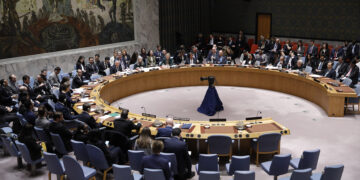Sarah Leah Whitson is the Executive Director of DAWN.
Sarah Leah Whitson and Abdullah Alodah
Sarah Leah Whitson is the executive director of DAWN (Democracy for the Arab World Now).
Published in Foreign Policy, April 27, 2020
Saudi Arabia's $500 billion planned high-tech city involves forced evictions and vague promises of compensation. The killing of an activist who protested the development has reminded the world how the kingdom handles dissent.
A few days after the Saudi Special Forces killed Abdulrahim al-Huwaiti on April 13, the government put out a statement labeling him a "wanted individual." Saudi authorities and online trolls referred to him as a "terrorist." Hours before his death, the tribesman had posted a YouTube video predicting just such a demise. It would be a setup, he explained in his video, punishment for protesting the government's efforts to forcibly displace the Huwaitat tribe to make way for the futuristic Saudi city of Neom.
For hundreds of years, the tribe had occupied villages and towns, including a historical capital, Khuraybah, across the northwestern province of Tabuk. Now, some 20,000 people are set to be pushed out to make room for Neom.
In 2017, Crown Prince Mohammed bin Salman announced his vision for a $500 billion high-tech dream city to be populated by global vacationers, technology start-ups, and rich investors. The planned 10,230-square-mile city—33 times the size of New York City—is a cornerstone of the crown prince's Vision 2030 plan to diversify the Saudi economy away from reliance on oil revenues. Officials promised the city would have more robots than humans, with mass facial recognition and surveillance to eliminate crime, drone-operated air taxis instead of roads, and a seaside luxury resort, cruise, and entertainment complex. Neom would be a miniature country with its own laws. The Huwaitat tribe would never fit into this glamorous cosmopolitan hub. And so the government would pay them for their land and nudge them out.
But things have not gone as planned. The killing of Huwaiti this month, and the government's heavy-handed effort to force the Huwaitat tribe to accept the terms of their displacement, is a microcosm of all that is wrong with the country's reckless and ruthless authoritarian ruler. Faced with the prospect of giving up their ancestral lands, where the tribe has lived for hundreds of years (well before the Kingdom of Saudi Arabia was established in 1932), protests have erupted over the past three months. At least 10 people have been arrested, and some have fled the country.
Rather than consult with the local community and seek to integrate them in the region's ambitious plans, the government has treated its citizens like disposable objects to be replaced by shiny, new cosmopolitan settlers. This is what happens when a thuggish ruler declares that he, and only he, will decide the future of his country (advised and assisted by well-paid American consultants and lawyers thousands of miles away), while Saudi citizens who express their own views, particularly critical ones, are ignored, silenced, jailed, or exterminated.
The circumstances surrounding Huwaiti's killing need investigation, and the government's statement raises more questions than it answers. What's clear is that Tabuk municipal authorities, overseen by the new National Program of Community Development, started issuing property confiscation orders in early January, according to local residents. The authorities offered residents only vague, verbal promises of temporary apartments and unspecified compensation. The residents told us there was no judicial process involved in reviewing the tribe's objections to the development project, their forced displacement, or the terms of the compensation.
Local sources said the vast majority of tribe members rejected the offer. But Huwaiti in particular became a public face of discontent. In January, he was part of a local group that met with a government representative to reject compensation and the tribe's displacement. On April 12, a day before he was killed, Huwaiti posted a YouTube video on his personal channel showing his title to the land. In another video posted that day, he insisted that he and others from his tribes wanted to stay in their historical lands and take part in Neom's development.
The government's statement makes no mention of this dispute. It claims that Huwaiti was armed and fired at security forces, and that they had no choice but to fire back and kill him. As predicted by Huwaiti, the statement claims soldiers found a stash of weapons at his house. Witnesses, however, dispute this account and say that he told the police on April 12 that he would not leave, and took photos of the police when they arrived to measure his land and house against his will. When special forces arrived the next day by the dozens in armored trucks, locals said they saw them surround the house and start shooting—and only then did he fire back. Since his murder, social media abroad has dubbed al-Huwaiti "the martyr of Neom," likening his killing to that of the country's most famous dissident, Jamal Khashoggi. Given the Saudi government's nonexistent credibility in the wake of its persistent lies about Khashoggi, it's unlikely the public at home or abroad will believe the government's latest account.
Massive development projects that involve taking locals' property are never an easy process, but international law provides basic standards on how a government can respect the rights of local communities in the process. The Saudi government has failed to employ even the most minimum standards on when and how states can expropriate property.
There is no evidence that the planned eviction of the Huwaitat tribe was a last resort as the law requires, and no fair process to determine whether the government offered them adequate compensation for their land and personal property. Saudi Arabia has no land law and the Law of Expropriation of Real Estate has no clear regulations on the process for resettling and compensating people who lose land to development projects. The government clearly failed to consult with civil society and the affected communities. Instead, the National Community Development Program summarily stated that residents will be given fair compensation, have access to social and economic support programs, and could share "inquiries and comments" at local centers.





































